

The Importance Of Learning Grammar From An Early Age. One of the key features of the National Curriculum, which was set in motion in 2014, was the introduction of Vocabulary, Grammar and Punctuation as an independent subject within the English Programme of Study for Key Stage 2.
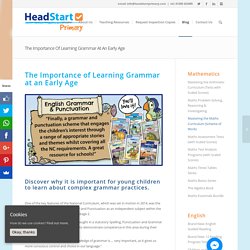
The Department of Education also brought in a statutory Spelling, Punctuation and Grammar or SPaG test, which requires children to demonstrate competence in this area during their KS2 SATs. The government states: “Explicit knowledge of grammar is … very important, as it gives us more conscious control and choice in our language.” So let’s go a little deeper into the theory behind teaching grammar and punctuation at primary level. One of the key features of the National Curriculum, which was set in motion in 2014, was the introduction of Vocabulary, Grammar and Punctuation as an independent subject within the English Programme of Study for Key Stage 2. So let’s go a little deeper into the theory behind teaching grammar and punctuation at primary level. EducatorsEn.
"I Said I Want the Red Bowl!" Responding to… Neurodiversity_TfS_online_conference. Teaching English to learners with Special Educational Needs (SENs) – Myths an... ‘I know I have children with special educational needs in my class, I want to help them and we are supposed to promote inclusion, but I really am not sure how to do this’ Vera, primary teacher from Spain ‘Some of the children in my class are really badly behaved, they can’t sit still, don’t finish their work and are always calling out.
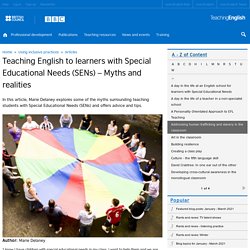
I think they might have a learning difficulty, but I don’t know what to do’ Kris, secondary teacher from Poland Do you feel like these teachers? The cognitive benefits of play: Effects on the learning brain. © 2008 - 2014, Gwen Dewar, Ph.D., all rights reserved Science supports many of our intuitions about the benefits of play. Playful behavior appears to have positive effects on the brain and on a child’s ability to learn. In fact, play may function as an important, if not crucial, mode for learning. Why Movement is Essential in Early Childhood. Community Playthings. Heuristic play is rooted in young children’s natural curiosity.
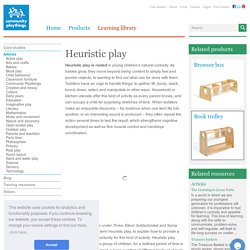
As babies grow, they move beyond being content to simply feel and ponder objects, to wanting to find out what can be done with them. Toddlers have an urge to handle things: to gather, fill, dump, stack, knock down, select and manipulate in other ways. Household or kitchen utensils offer this kind of activity as every parent knows, and can occupy a child for surprising stretches of time. When toddlers make an enjoyable discovery – for instance when one item fits into another, or an interesting sound is produced – they often repeat the action several times to test the result, which strengthens cognitive development as well as fine muscle control and hand/eye coordination.
C1 WRITING – WRITING A REVIEW FOR TASK 2 OF THE ADVANCED EXAM – Intercambio I... This post aims to explain how to write a review for the C1 Advanced Cambridge exam .

A review is one of the options in the 2nd task of the writing exam. The main purpose of a review is to give your personal opinion about something, suggesting what is good or bad about it. Reviews are usually written for newspapers, websites or magazines and therefore have a fairly informal style. The text should be personal and include your personal opinion. It is a good idea to include: a titlestate what you are reviewinga brief descriptionrecommendations of target audience and summarize the review 5 Simple Ways to Improve your Written English. Tips on Learning to Talk. Learning to talk is a process that starts at birth, when your baby experiences how voices can sound.
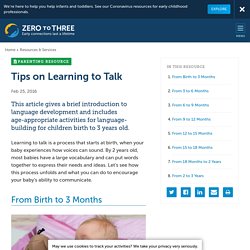
By 2 years old, most babies have a large vocabulary and can put words together to express their needs and ideas. Let’s see how this process unfolds and what you can do to encourage your baby’s ability to communicate. From Birth to 3 Months Your baby listens to your voice. He coos and gurgles and tries to make the same sounds you make.
Sing to your baby. From 3 to 6 Months Your baby is learning how people talk to each other. Hold your baby close so he will look in your eyes.Talk to him and smile.When your baby babbles, imitate the sounds.If he tries to make the same sound you do, say the word again. From 6 to 9 Months Your baby will play with sounds. A few more myths about speakers of multiple languages. Does multilingualism cause language delays and identity problems? The British Council's Nayr Ibrahim busts a few more myths about speakers of multiple languages. Myth: Multilingualism causes language delay Raising children bilingually is sometimes believed to cause language delay.
Does being bilingual make you smarter? Language teacher and researcher Miguel Angel Muñoz explains the latest research on how being bilingual affects your brain, ahead of a British Council seminar in Cardiff on whether learning a foreign language makes you smarter. You can watch the live-streamed seminar on Tuesday, 3 June. KQED Public Media for Northern CA. How young children learn English as another language. By Opal Dunn, educational consultant and author Introduction Young children are natural language acquirers; they are self-motivated to pick up language without conscious learning, unlike adolescents and adults.
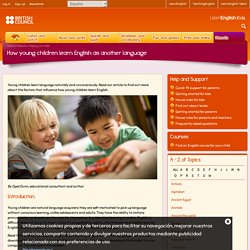
They have the ability to imitate pronunciation and work out the rules for themselves. Any idea that learning to talk in English is difficult does not occur to them unless it’s suggested by adults, who themselves probably learned English academically at a later age through grammar-based text books. Read the notes below about young children learning English as another language. The advantages of beginning early.
How can young children best learn languages? The British Council's Tracey Chapelton explains how parents of young children can lay the foundations for success. Children's brains are highly active Your child is unique, but what all children have in common is natural curiosity and an innate ability to learn. Kuhl states that babies and young children are geniuses at acquiring a second language. 'Babies', she says, 'can discriminate all the sounds of all languages... and that's remarkable because you and I can't do that.
We're culture-bound listeners. The Power of Evening Routines. The word “structure” can evoke less than positive associations. It suggests constraints, which are never a good thing, right? Wrong. It turns out that everyone benefits from a certain amount of daily structure, so long as that structure is pleasant, productive, and meaningful. Whether it’s the most inventive minds in history, or those people who live in good health past 100, a daily routine or set of micro-routines is correlated with productivity, health, and longevity. The Woman Who Changed Her Brain: Barbara Arrowsmith-Young at TEDxToronto.
How baby brains develop. Early childhood development – it’s not rocket science, it’s neuroscience! - Kathy Brodie Early Years Training. Multilingual Preschoolers.